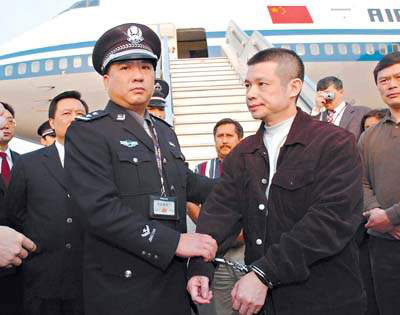|
China widens net for fugitive fraudsters
(Agencies/Xinhua)
Updated: 2006-04-29 15:06
In a warning shot to corrupt officials on the run, China's top legislature on
Saturday ratified an extradition treaty with Spain which includes an
unprecedented pledge not to execute repatriated criminals, Xinhua News Agency
said.
The treaty would pave the way for more such judicial cooperation
with other Western countries, and help in China's fight to bring back thousands
of Chinese officials who had absconded with government funds, the reports said.

Yu Zhendong, on the
run for four years, is arrested after being extradited from the
United States April 16, 2004. Yu was a banker of the Bank of China Kaiping
Branch and was charged for embezzlement.
[Xinhua] |
"Spain is an influential country in the EU (European Union), and the
treaty will effectively deliver the warning to corrupt officials who are at
large on foreign lands," Deputy Foreign Minister Wu Dawei was quoted as telling
parliament's Standing Committee in a report this week.
Fueled by surging
economic figures, crimes such as bribery, embezzlement have increased among
government officials in China, and a large number of crooked officials fled
China after reaping huge profits as police have come to be on
alert.
According to a 2004 report released by the research institute
attached to the Ministry of Commerce, about 4,000 crooked Chinese officials had
fled overseas since China launched economic reforms in 1978, taking away funds
equal to US$50 billion.
Statistics from the police authorities said
there were still 500 economic crime suspects on the run in foreign countries in
2004. The money involved in these cases topped 70 billion yuan. A mere fraction
have been repatriated. Official figures show that, from 1993 to January 2005,
more than 230 Chinese criminal suspects had been sent back, Xinhua
said.
Xinhua quoted legal experts on Saturday as saying the
ratification meant China had committed legally to respect the principle observed
by major Western countries not to extradite criminal suspects who would face the
death penalty at home.
The treaty marked a major shift in tactics in
bringing fugitive corrupt officials to justice, Xu Hong, counsellor with the
Department of Treaty and Law under the Ministry of Foreign Affairs, told Xinhua
in an interview.
"The treaty will help China weave a global extradition
net to bring back corrupt officials who have fled abroad, largely seeking asylum
in developed countries in Europe and North America," said Xu, who headed the
Chinese delegation in the talks with Spain.
President Hu Jintao signed
the treaty with Spain in Madrid in November 2005.
One of China's most
wanted fugitives, smuggling kingpin Lai Changxing, has been fighting extradition
from Canada since fleeing there in 1999. China has pledged Lai would not be
executed if he were returned and found guilty.
This year, Yu Zhendong a
former Bank of China manager convicted in the United States before being
deported on corruption charges at home, was sentenced to 12 years in prison.
China had promised he would not be tortured or executed.
The top legislature on Saturday also ratified an extradition treaty with
Brazil, two treaties on legal assistance in criminal matters with Spain and
France respectively, without the reference to how to handle suspects who might
face death penalty.
Since 1993, China has signed extradition
treaties with over 20 countries, mostly developing ones including Thailand,
Laos, Belarus and South Africa. "Negotiations with developed countries were
moving slowly," said Xu.
Observers said China's use of death penalty,
especially on severe economic crimes, makes it hard for the country to cooperate
on extradition with countries in the EU and North America who uphold the policy
that no person who might be subject to the death penalty would be extradited.
|
| |
|
| |
|